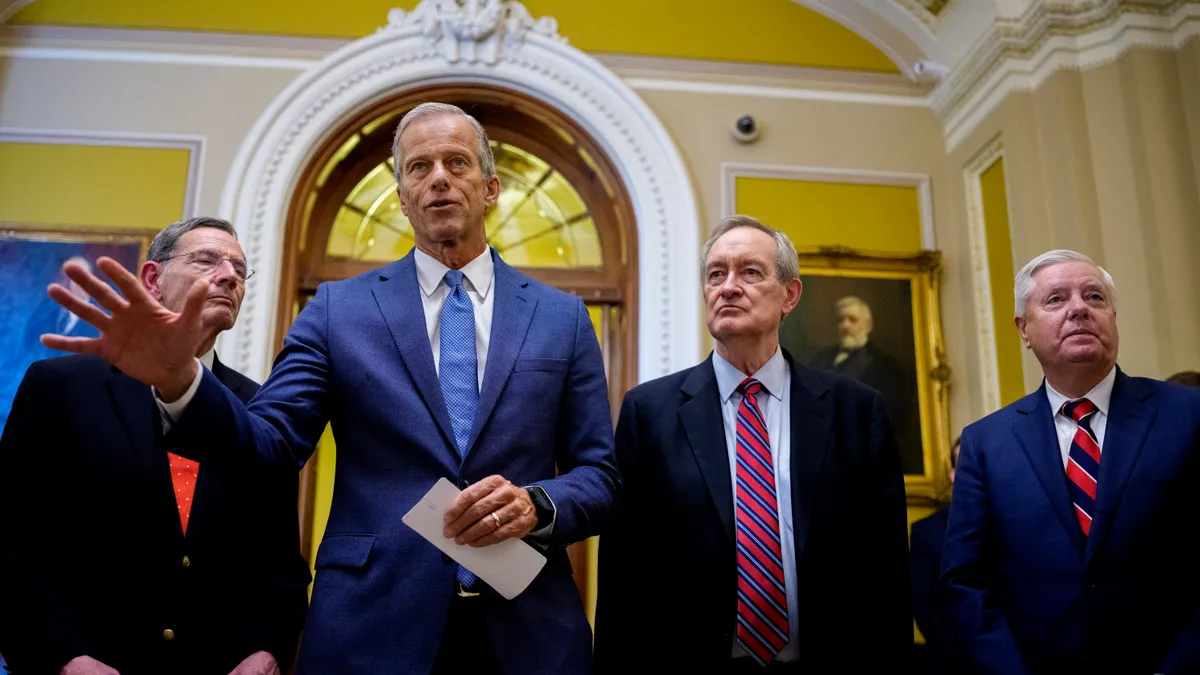What could the election of Donald Trump as president in November mean for the Inflation Reduction Act, which marks the nation’s largest-ever investment in climate action? Could the new administration withhold or reallocate unspent money — or even claw back funds that have already been awarded to states, cities, nonprofits and others to fight and adapt to climate change?
The law includes $369 billion for energy and climate spending, including incentives for clean transportation, battery manufacturing, renewables and a host of other advanced energy technologies.
A report published last week by legal experts at Columbia University’s Sabin Center for Climate Change Law drills down into how the next presidential election could “jeopardize the IRA’s climate programs.” The report specifically looks at a situation in which the IRA is not repealed but in which the next presidential administration seeks to undermine it. Project 2025, a blueprint by conservative thinkers for a second Trump term, calls for the full repeal of the IRA and, short of that, advocates for the president to take steps to reduce its impact.
Here are the answers to three key questions local government leaders may have about the report.
Could the Trump administration claw back already awarded funds?
The good news for states and localities that have been awarded IRA funds is that presidential administration attempts to take back already-awarded funds are unlikely to stand up in court, the report says. It defines awarded funds as those committed by contract or another binding, enforceable mechanism to a specific recipient.
Each award agreement details in what cases the award could be terminated, but those documents aren’t public. However, the report explains that federal awards can be terminated if:
- A grantee fails to comply with the agreement.
- A grantee chooses to terminate the agreement with reasonable notice.
- The federal government and grantee mutually decide to terminate the agreement.
- The award no longer serves the funding program’s goals or agency priorities, to the extent authorized by the law.
That last case is where things become complicated. The Biden administration may have written award agreements to allow award termination only in the first three cases, the report says. But if it hasn’t, and terminations are allowed under the fourth case, a future administration may have greater discretion to terminate awards.
“Agencies might seek to argue that shifting administrative priorities justify termination of IRA awards, but that argument is unlikely to be successful,” the report says. In the limited court decisions available related to that fourth provision, the courts have said that agencies have to look at whether the funding program aligns with the reasons Congress set it up, said Romany Webb, report co-author and Sabin Center deputy director.
“Agencies couldn't just say ‘Well, we have a new administration now, [and] we're no longer prioritizing action on climate change, so we're going to terminate these awards,’” she said. “They really have to look at the purposes for which the money was made available under the IRA.” An agency would have to show that an award isn’t achieving the purpose of that program; for example, it would have to show that an award given through an energy efficiency program was being spent by a state or locality on something unrelated.
But that doesn’t mean states and cities have nothing to worry about. “Even though it would be difficult, and we think that any attempt to claw back [awards] could be challenged successfully in court, that does not mean that we won't see attempts to claw back,” Webb said. Those attempts could hinder local governments’ ability to move forward with planned projects as litigation plays out, she added.
Webb advises states and localities concerned about clawbacks to use their awards as quickly as possible. “The more efficient they can be in that regard, the better,” Webb said. States and cities that have received funds should also prepare for attempts to claw back funds by making sure they can clearly demonstrate how they’ve used the money and met milestones agreed upon with the federal government.
What could Trump do with unspent IRA money?
Billions of dollars in IRA funding could remain unspent by the time Trump is potentially sworn into office. His administration could try to reallocate those funds for other purposes or withhold them altogether, the Sabin Center report explains.
In the case of the IRA, funds are allowed to be “reprogrammed,” but that can’t result in the creation of new programs, the elimination of existing programs or the transfer of more than 10% of the money allocated to any program, Webb explained. “Ten percent sounds pretty low, but it's important to remember, of course, that some of these programs are [$4 billion to $6 billion],” she said. In addition, any reprogramming of funds generally has to happen within the same appropriations account; such accounts are usually set up on an agency-by-agency basis and can be quite specific, she explained.
“There is also the potential that a Trump administration might just sit on its hands and decide not to hand out any money,” Webb said. States, cities and other organizations may have a very narrow window of time years from now to sue the federal government for withholding funds, she explained. “In most cases, the funds remain available through Sept. 30, 2031,” Webb said. “That means ... an action challenging the failure to spend couldn't be brought until that period of availability had ended.”
Challengers would need to move quickly. Soon after that expiration date, the money gets transferred back to a general Treasury account, after which the lawsuit becomes moot, meaning parties can no longer file suit, Webb said.
“The near-term opportunities to challenge withholding [of funds], in particular, are really limited,” Webb said.
What about elective pay?
For the first time, under the IRA, state and local governments looking to build clean energy projects have access to elective, or direct, pay, which allows tax-exempt entities to take advantage of rebates. Organizations like Climate Mayors have hailed these incentives, valued at billions of dollars, as an opportunity to turbocharge local climate action.
The IRA’s revisions to the tax code are generally less vulnerable to direct presidential administration interference than the spending provisions, the report says. However, significant opportunities still exist to disrupt the implementation of elective pay, Webb said. A Trump administration could “inject a lot of uncertainty” by revising IRS regulations and guidance, making the process of accessing rebates more difficult and uncertain, she said.
“That could have a really big impact in terms of whether people practically seek to take advantage of those programs,” Webb said.
























